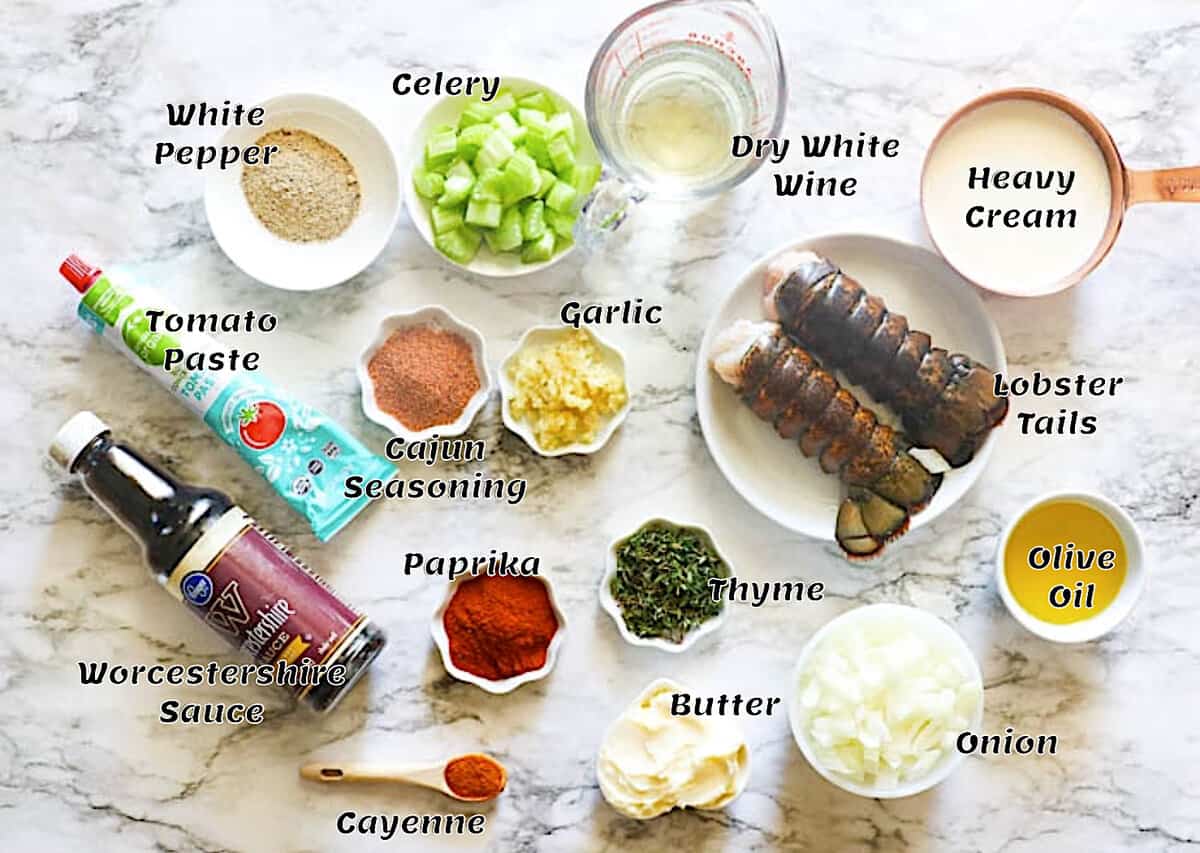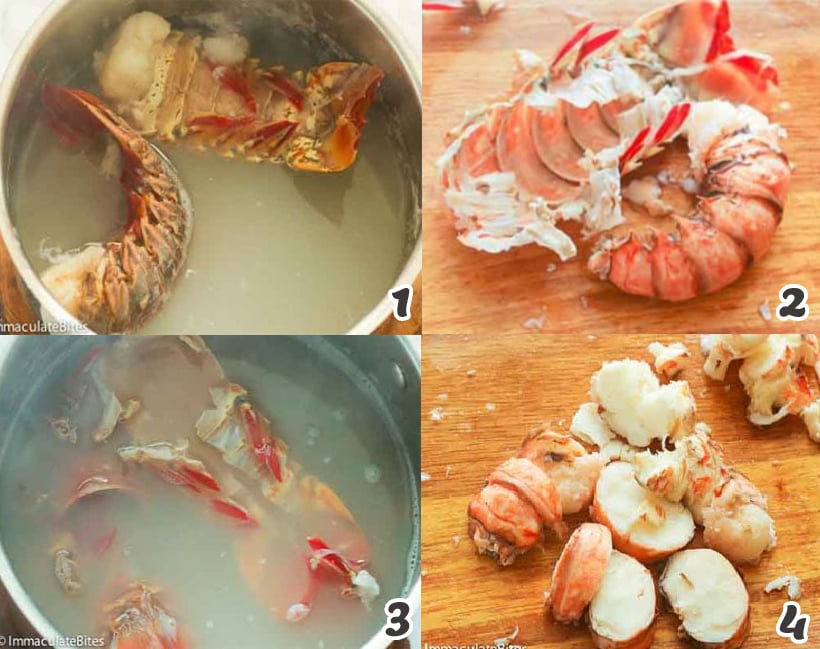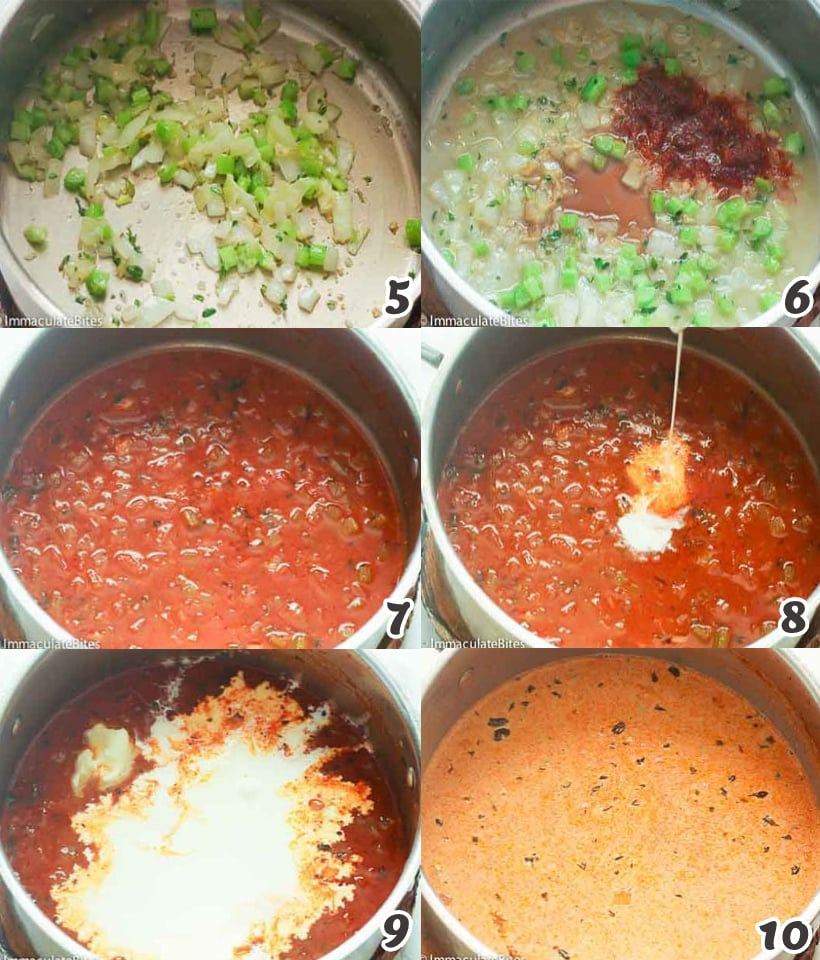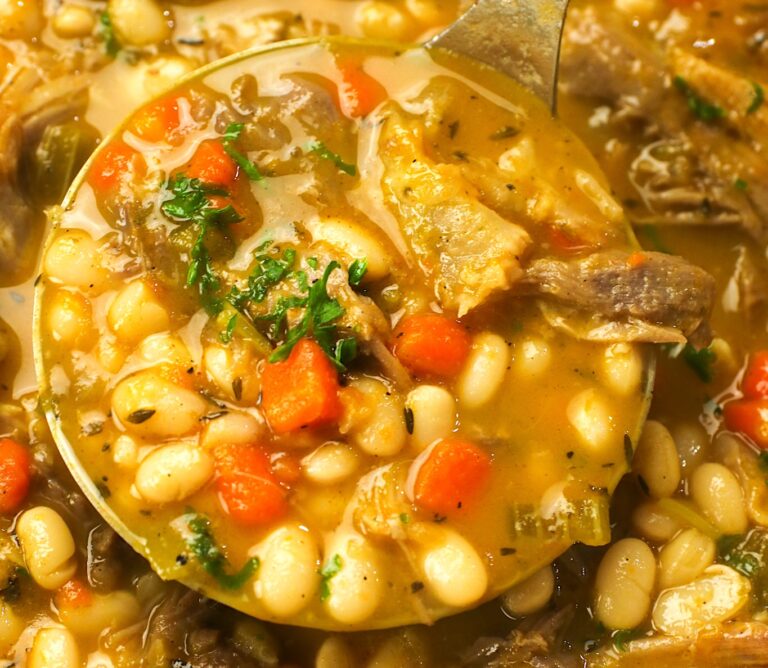Lobster Bisque (Plus Video)
Lobster Bisque delivers a creamy, silky-smooth, and well-seasoned soup with lobster and cream. Perfect for your sweetheart on Valentine’s Day, or any day of the year for that matter. Enjoy an indulgent five-star meal at home for a cozy, romantic dinner date.

I love lobster everything: grilled lobster tail, lobster rolls, you name it. And this classic lobster bisque recipe is as good or better than anything you’d get at a fancy-schmancy restaurant. But without the hefty price tag. 😉
And did I mention that this soup is keto-friendly and gluten-free? Woohoo!
Content…What Is It? |

What Is Lobster Bisque?
First off, cream is what makes it a bisque. Pureeing the ingredients to pure silky goodness is also classic for making a traditional bisque. While most bisques boast shrimp or lobster, you don’t have to use crustaceans. You can use tomatoes, butternut squash, mushrooms, and red peppers for an incredible bisque.
However, for lobster bisque, you obviously need lobster. And you don’t waste anything because the shells make a rich seafood broth (think stock but made with the shells instead of beef or chicken bones). So let’s get to the good stuff.
Recipe Ingredients

- Lobster Tails – Fresh or frozen work fine for this recipe. Of course, you can get live lobsters, too.
- Seasonings – Garlic, onion, celery, fresh thyme, and Creole seasoning deliver the ultimate flavor explosion.
- More Flavor – A dry white wine, Worcestershire sauce, lobster stock, and heavy cream make a decadent creamy soup base.
How to Make Lobster Bisque

Prep Lobster and Stock
- Cook Lobster – Boil the lobster tails for 3-4 minutes (long enough for the shells to turn slightly red). Let them cool. (Photo 1)
- Prep Lobster Meat – Place the tails on their side on your work surface and use both hands to press down until the shell cracks. Hold the tail with your thumbs (with the flippers toward you and the shell facing down) on opposite sides. Pull both sides back to crack open the shell and remove the meat.
- Alternative – Cut down the center of the tail with kitchen shears and remove the meat. (Photo 2)
- Make Stock – Return the lobster shells to the pot, and add 4-5 cups water. Bring to a boil, lower heat to medium-low, and simmer for at least 20-25 minutes (if time permits, simmer for an extra 20 minutes). Strain and discard the shells. (Photo 3)
- Chop the Lobster Meat – Chop the lobster meat into bite-sized pieces while the stock is simmering. Chill until ready to use. (Photo 4)

Make the Bisque
- Saute – Heat olive oil in a medium-sized saucepan over medium-high heat. Then saute onion, garlic, celery, and thyme for 4-5 minutes. (Photo 5)
- Flavor – Slowly add the wine, if using, then stir in the Worcestershire, Creole seasoning, paprika, and white pepper. Cook for about a minute. (Photo 6)
- Simmer – Then stir in the tomato paste and 2-2½ cups of the lobster stock. Simmer for 8-10 minutes. (Photo 7)
- Make it Creamy – Pour in the cream and butter, let the butter melt, then remove from stove. (Photos 8-10)
- Puree – Carefully pour it into a blender and puree in batches to avoid pressure building up. Or use a stick blender in the pot until your bisque is smooth.
- Adjust the seasoning with cayenne and salt to taste.
- Assembly – Heat a saucepan over medium and add a tablespoon of butter, followed by the chopped lobster. Then lightly season with Creole seasoning, and simmer for a minute or two until heated.
- Serve – Divide the bisque into serving bowls, top with lobster, and serve immediately.

Recipe Variations
- Seafood – Clams, shrimp, oysters, crayfish, and crab are popular bisque variations. Try my shrimp bisque for a more economical but just as delicious version. 😉
- Vegetarian – Of course, you can make yummy plant-based bisque like my hearty tomato bisque. Squash, corn, potatoes, carrots, and sweet potatoes also make a bisque base.
Tips and Tricks
- You’ll only need 2½ cups of the stock for your bisque, but you don’t need to waste the extra because it freezes well.
- Omit the cayenne if you prefer a milder bisque.
- Lobster tails are usually in the frozen seafood section at most grocery stores. If you go for fresh lobsters, make sure they’re still alive and keep them alive until the last second.
- Swap white wine with brandy for a sweet aroma and subtler presence. Or replace it with stock for alcohol-free bisque.
- Use a fine-mesh strainer to strain the bisque from the blender for a smoother texture.
Serving and Storage Instructions
Lobster Bisque is best as soon as it’s done and still hot. Yum!
I don’t recommend making it ahead since neither lobster nor heavy cream do well in the freezer. But for leftovers, let them completely cool before refrigerating them in an airtight container for up to two days.
Reheat over low heat on the stovetop, covered, occasionally stirring until hot. Or reheat individual servings in the microwave on medium power in 30-second blasts until hot.
What to Serve With Lobster Bisque
Make it a cozy date-night dinner with good background music, good wine, and amazing side dishes. Garlic bread or potato bread rolls, roasted baby carrots, and sauteed Brussels sprouts will definitely impress your better half.
Wine pairing: A chilled Chardonnay or dry Riesling is perfect with lobster bisque.
More Amazing Soup Recipes to Try
Watch How to Make It
[adthrive-in-post-video-player video-id=”QoIpsNAI” upload-date=”2020-12-26T11:52:57.000Z” name=”Lobster Bisque” description=”Lobster Bisque – a classic creamy and smooth, highly seasoned soup made from lobster and aromatics that is a Valentine’s Day favorite entree or served as a first course. A dreamy indulgence of a five-star dining experience – just in time for a cozy date night at home!” player-type=”collapse” override-embed=”false”]
This blog post was first published in February 2018 and has been updated with additional tips, new photos, and a video








This was my first time making Lobster Bisque and I’m very impressed with this recipe, so delicious that my husband said it was the absolute best meal he’s ever had and he’s 65 so he’s tasted a few meals in his life!! It was easy to make too, just need to have the time to let the stock develop the flavours. I made my own creole seasoning and used a mortar and pestle to grind the herbs to a fine powder (I find dry thyme can be a bit gritty). I found the creole seasoning recipe on allrecipes.com Omit the cayenne pepper if you don’t want any heat. To make smaller quantities just use the 1/2 or 1/4 teaspoon measure instead of the tablespoon measure but using the same ratios. I also found a website that recommended to cook the lobsters for 1 minute per 100 grams so that’s what I did, they were so tender!!
Hi Heather,
Wow—what a glowing review, thank you! I’m so thrilled to hear it was such a hit (and with a seasoned food critic at home too ). Love that you made your own Creole seasoning and even used a mortar and pestle—such a thoughtful touch to get that smooth blend. Great tip on cooking the lobster by weight for tenderness! Thanks so much for sharing all your tweaks—it’s going to help so many others trying this recipe.
This recipe has so much flavor. The spices don’t overwhelm the lobster (I omitted the cayenne). Better than any restaurant and not difficult to make. Thank you!
Hi Kat, Thank you so much! I’m thrilled you loved it—and great call on adjusting the spice to your taste. Even without the cayenne, it’s all about balance. So glad it beat the restaurant version!
Everything was great but the creole seasoning made it way to spicy for the rest of my family. Maybe include in the description that that seasoning is optional, and spicy. I followed the recipe to a T and am honestly surprised no one else has mentioned that.
Thanks for your feedback! Creole seasoning can vary in heat depending on the brand, which might be why it turned out spicier than expected. Next time, you can try a homemade version where you can control the spice level to better suit your family’s taste. I appreciate you giving the recipe a try and sharing your experience!